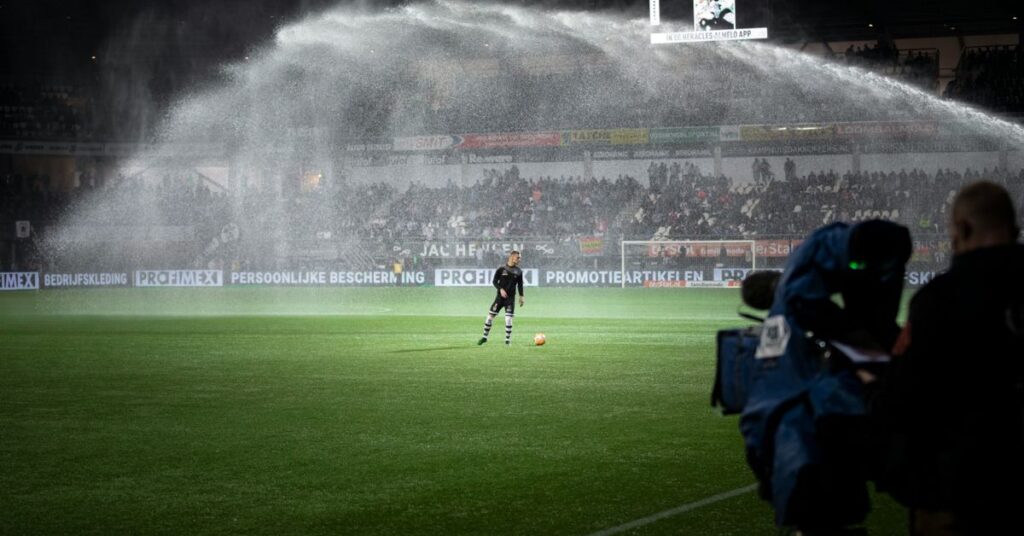The Unfiltered Truth: What Athletes Wish Fans Knew About Game Day Decisions

The Unfiltered Truth: What Athletes Wish Fans Knew About Game Day Decisions
As the sun rises on game day, a palpable energy fills the air. Fans don their team colors, stadiums buzz with excitement, and the aroma of hot dogs wafts through the parking lot. But behind the scenes, athletes are grappling with a multitude of decisions that fans often overlook. What goes through their minds as they prepare to take the field? What do they wish fans understood about the pressures, strategies, and emotions that play a critical role in game day? Buckle up, because we’re about to dive into the unfiltered truth about game day decisions.
The Pressure Cooker: Emotional and Mental Strain
Imagine standing in front of thousands of eyes, each one fixated on you, waiting for a mistake—a single misstep that could shatter dreams or solidify legacies. For athletes, game day is not just about physical prowess; it’s also a mental marathon. The pressure to perform can be suffocating. “I remember early in my career,” says former NFL quarterback Jake Thompson, “I was so nervous before a game that I’d be sick to my stomach. It took me years to learn how to channel that anxiety into focus.”
Many athletes find themselves wrestling with self-doubt, especially when facing high-stakes situations. The weight of expectations—both from fans and themselves—can be overwhelming. This is particularly true in the playoffs, where the stakes are higher than ever. “Fans see the highlights, but they don’t see the sleepless nights leading up to a big game,” shares star forward Maya Lee of the WNBA. “It’s an emotional rollercoaster.”
Team Dynamics: Decisions Beyond the Individual
When fans watch a game, they often focus on individual performances. However, the reality is that athletes operate within a complex web of team dynamics. Coaches and players must make game day decisions that account for not just personal performance, but also the strengths and weaknesses of teammates and opponents. This can lead to some tough calls.
Take, for instance, the decision to start or bench a player. Coaches weigh many factors: the player’s current form, the opposing team’s strategy, even the weather conditions. “It’s not just about who’s the best player,” explains veteran coach Tom Richards. “Sometimes it’s about matchups. You have to play the odds.”
And then there’s the infamous “gut feeling.” Coaches and athletes alike often rely on instinct when making last-minute decisions. “I’ve seen coaches make calls that didn’t make sense on paper, but later turned out to be game-changers,” says Richards. “It’s a blend of analytics and intuition.”
Injury Reports and Last-Minute Changes
Injuries can throw a wrench into even the best-laid plans. Athletes often have to make quick decisions based on their physical condition. “I’ve played through injuries that would make most people cringe,” admits NHL player Alex Carter. “But you have to think about the team. Sometimes, you have to push through the pain, even when your body is screaming at you to stop.”
Fans might be surprised to learn how often athletes play while injured, often due to the immense pressure to perform. “There’s a code among us,” Carter continues. “You don’t want to let your brothers down. But that doesn’t mean it’s always the right choice.”
Strategies and Game Plans: The Art of the Playbook
Game day decisions also encompass strategies and plays that athletes must execute flawlessly. Coaches spend countless hours crafting game plans, which athletes must absorb and adapt to changing circumstances on the field. This is where preparation meets improvisation.
“You can plan all you want, but the game has a way of throwing curveballs,” says basketball player John Ramirez. “You have to be ready to pivot on a dime.” This adaptability is crucial, especially in fast-paced sports where the momentum can shift in seconds.
For fans, it can be perplexing to see a team abandon a strategy mid-game. But in reality, athletes are constantly evaluating the situation. “Sometimes, you have to trust your instincts over the playbook,” Ramirez explains, “and that can lead to some unexpected outcomes.”
Communication: The Unsung Hero of Game Day
Communication is the lifeblood of any sports team. Athletes rely on verbal and non-verbal cues to convey strategies and make split-second decisions. But what happens when that communication breaks down? The results can be catastrophic. “I remember a game where we completely miscommunicated on a defensive play, and it cost us the game,” says linebacker Sarah Johnson. “It was a tough lesson.”
As fans, we often focus on the physical aspects of the game—who scored, who made the tackle—but the importance of communication can’t be overstated. “It’s not just about talent,” Johnson continues. “Sometimes, it’s about who can talk the best under pressure.”
The Role of Analytics: Numbers vs. Intuition
In this age of data-driven decisions, analytics play a significant role in game day strategies. Coaches and teams have access to a mountain of statistics, which can inform everything from player matchups to play calling. However, there’s a fine line between relying on numbers and trusting one’s gut.
“Analytics are great,” says former MLB pitcher Brian Lee. “But at the end of the day, you have to trust your instincts. Numbers can’t account for the human element.” Many athletes express concern that an overreliance on analytics can stifle creativity and spontaneity on the field. “We’re not robots,” Lee adds. “We’re human beings playing a game.”
Fan Expectations: The Double-Edged Sword
While fans are the lifeblood of sports, their expectations can create a unique pressure cooker for athletes. The cheers, the jeers, the social media buzz—all of it can weigh heavily on an athlete’s mind as they step onto the field. “I love our fans, but sometimes I wish they knew how much we feel their energy—both good and bad,” says soccer star Emily Grant.
There’s a delicate balance between wanting to please fans and staying true to oneself as an athlete. “You want to perform for them, but you also have to remember that you’re doing this for yourself,” Grant explains. “It’s a tough line to walk.”
Media Scrutiny: A Constant Companion
For many athletes, the media is both a friend and a foe. On one hand, it provides visibility and opportunities. On the other hand, it can amplify mistakes and create narratives that can overshadow performance. “You can make one bad play, and suddenly it’s front-page news,” remarks tennis player Liam Foster. “It’s a pressure cooker that never turns off.”
Foster recalls a particularly challenging match where he felt he played well, yet the headlines focused on a single mistake. “It struck me that the media doesn’t always capture the full picture,” he notes. “Fans need to understand that we’re more than just our stats.”
The Importance of Support Systems
In an environment fueled by pressure and expectation, having a solid support system is crucial for athletes. Family, friends, coaches, and teammates all play a role in helping athletes navigate the ups and downs of game day decisions. “My family keeps me grounded,” shares swimmer Jessica Hart. “They remind me that at the end of the day, it’s just a game.”
Support systems also extend to mental health professionals. Many athletes have begun to recognize the importance of mental wellness, particularly as they grapple with the intense pressures of competition. “I see a therapist regularly,” admits Hart. “It’s helped me manage the anxiety that comes with game day.”
Anecdotes from the Trenches: What Really Happens
Let’s take a moment to look back at some memorable game day moments that exemplify the challenges athletes face. There’s the infamous “Miracle on Ice,” when the U.S. hockey team pulled off an unimaginable upset against the Soviet Union in 1980. The players’ ability to stay calm under pressure and adapt their strategy was pivotal. “We just had this feeling,” recalls team captain Mike Eruzione. “It was like we were invincible.”
Contrast that with the infamous “Fail Mary” in the NFL, a play that still sparks debates among fans. The miscommunication between players and referees led to one of the most controversial touchdowns in history. “It was chaotic,” reflects former player Mike Williams. “We were all just trying to make sense of what was happening.”
These stories serve as reminders that behind every game day decision lies a multitude of factors that can shape the outcome. Athletes wish fans knew the full scope of these experiences.
Taking Responsibility: The Burden of Accountability
With great power comes great responsibility—at least, that’s what they say. For athletes, the burden of accountability is ever-present. Each decision they make can have far-reaching consequences for their team, their careers, and their fans. “You have to own your mistakes,” says soccer player Matt Rivera. “It’s part of being a professional.”
Rivera recalls a game where he missed a penalty shot that could have secured a win. “I felt like I let everyone down,” he admits. “But my teammates reminded me that we win and lose together.”
The Human Element: Beyond the Game
At the end of the day, athletes are human beings with emotions, dreams, and fears. They experience joy in victory and heartache in defeat, just like the fans cheering them on. “I wish fans knew how much we care,” shares Olympic gymnast Sarah Lin. “We pour our hearts into this sport. It’s not just about the medals; it’s about the journey.”
And while fans can sometimes be critical, it’s important to remember the sacrifices athletes make. “We’re out there risking everything—not just our bodies, but our mental health too,” says Lin. “It’s a tough gig, but we love it.”
Final Thoughts: A Call for Empathy
As we wrap up this exploration of game day decisions, it’s essential to remember the human side of sports. Athletes are not just entertainers; they are individuals navigating a complex world filled with pressures, expectations, and tough choices. The next time you’re watching a game, take a moment to consider what goes into those decisions. Empathy can go a long way.
So, whether it’s cheering for a last-minute goal or shaking your head at a controversial call, remember that behind every play is an athlete who, like you, is just trying to do their best. The unfiltered truth is that while we may not always understand their choices, we can certainly appreciate the effort they put into every game.
And who knows? Maybe the next time your team takes the field, you’ll have a deeper appreciation for what those athletes are going through—both on and off the field. After all, it’s not just about the game; it’s about the heart and soul that fuels it.





